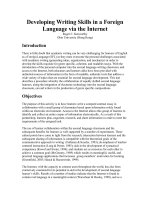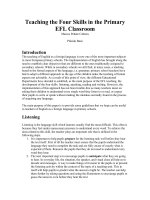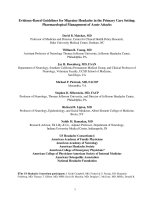Teaching the Four Skills in the Primary EFL Classroom
Bạn đang xem bản rút gọn của tài liệu. Xem và tải ngay bản đầy đủ của tài liệu tại đây (62.34 KB, 3 trang )
Teaching the Four Skills in the Primary
EFL Classroom
Marcos Peñate Cabrera
Plácido Bazo
Introduction
The teaching of English as a foreign language is now one of the most important subjects in
most European primary schools. The implementation of English has brought along the need
to establish clear objectives that are different to the ones traditionally assigned to secondary
schools. While in secondary schools we still find, in many cases, a teaching based in the
formal aspects of the language, i.e. grammar; primary school teachers have had to adopt a
different approach as the age of the children make the teaching of formal aspects not
advisable. As a result of this point of view, the different Educational Departments have
decided to establish, as the main purpose of the EFL teaching, the development of the four
skills: listening, speaking, reading and writing. However, the implementation of this
approach has not been trouble-free as many teachers insist on asking their children to
understand every single word they listen to or read, or expect their pupils to write or speak
without making the mistakes normally found in the process of acquiring any language.
The main purpose of this paper is to provide some guidelines that we hope can be useful to
teachers of English as a foreign language in primary schools.
Listening
Listening is the language skill which learners usually find the most difficult. This often is
because they feel under unnecessary pressure to understand every word. To achieve the
aims related to this skill, the teacher plays an important role that is defined in the following
steps.
1. It is important to help pupils prepare for the listening task well before they hear the
text itself. First of all the teacher must ensure that the pupils understand the
language they need to complete the task and are fully aware of exactly what is
expected of them. Reassure the pupils that they do not need to understand every
word they hear.
2. The next important step is to encourage pupils to anticipate what they are going to
hear. In everyday life, the situation, the speaker, and visual clues all help us to
decode oral messages. A way to make things a bit easier to the pupils is to present
the listening activity within the context of the topic of a teaching unit. This in itself
will help pupils to predict what the answers might be. The teacher can help them
further by asking questions and using the illustrations to encourage pupils to guess
the answers even before they hear the text.
3. During the listening the pupils should be able to concentrate on understanding the
message so make sure they are not trying to read, draw, and write at the same time.
Always give a second chance to listen to the text to provide a new opportunity to
those who were not able to do the task.
4. Finally, when pupils have completed the activity, invite answers from the whole
class. Try not to put individual pupils under undue pressure. Rather than confirming
whether an answer is correct or not, play the cassette again and allow pupils to
listen again for confirmation. You may be given a variety of answers, in which case
list them all on the board and play the text again, so that the class can listen and
choose the correct one. Even if the pupils all appear to have completed the task
successfully, always encourage them to listen to the text once more and check their
answers for themselves.
Speaking
First of all, we must take into account that the level of language input (listening) must be
higher than the level of language production expected of the pupils. So we have many
speaking activities used in the first levels that enable pupils to participate with a minimal
verbal response. However in the last levels, pupils are encouraged to begin to manipulate
language and express themselves in a much more personal way.
In primary schools two main types of speaking activities are used. The first type, songs,
chants, and poems, encourages pupils to mimic the model they hear on the cassette. This
helps pupils to master the sounds, rhythms, and intonation of the English language through
simple reproduction. The games and pair work activities on the other hand, although
always based on a given model, encourage the pupils to begin to manipulate the language
by presenting them with a certain amount of choice, albeit within a fairly controlled
situation.
In order for any speaking activity to be successful children need to acknowledge that there
is a real reason for asking a question or giving a piece of information. Therefore, make sure
the activities you present to the pupils, provide a reason for speaking, whether this is to
play a game or to find out real information about friends in the class.
Once the activity begins, make sure that the children are speaking as much English as
possible without interfering to correct the mistakes that they will probably make. Try to
treat errors casually by praising the utterance and simply repeating it correctly without
necessarily highlighting the errors. And finally, always offer praise for effort regardless of
the accuracy of the English produced.
Reading
In order to make reading an interesting challenge as opposed to a tedious chore, it is
important that pupils do not labour over every word, whether they are skimming the text
for general meaning or scanning it to pick out specific information. Other things to keep in
mind are:
1. When choosing texts consider not only their difficulty level, but also their interest
or their humour so that children will want to read for the same reasons they read in
their own language: to be entertained or to find out something they do not already
know.
2. As with listening activities, it is important to spend time preparing for the task by
using the illustrations (a usual feature in reading activities for children), pupils' own
knowledge about the subject matter, and key vocabulary to help the pupils to
predict the general content of the text. Discuss the subject and ask questions to
elicit language and to stimulate the pupils' interest in the text before they begin
reading. Also make sure that the pupils understand the essential vocabulary they
need to complete the task before they begin to read.
3. While the children are reading the text, move around the class providing support if
pupils need it. Where possible, encourage pupils to work out the meaning of
vocabulary as they come across it, using the context and the supporting
illustrations.
4. Do not encourage pupils to read texts aloud unless this is to learn a play or recite a
poem. Reading aloud inhibits most pupils and forces them to concentrate on what
they are saying as opposed to what they are reading and the meaning is very often
lost.
Writing
In primary schools, EFL pupils progress from writing isolated words and phrases, to short
paragraphs about themselves or about very familiar topics (family, home, hobbies, friends,
food, etc.)
Since many pupils at this level are not yet capable either linguistically or intellectually of
creating a piece of written text from scratch, it is important that time is spent building up
the language they will need and providing a model on which they can then base their own
efforts. The writing activities should therefore be based on a parallel text and guide the
pupils, using simple cues. These writing activities generally appear towards the end of a
unit so that pupils have had plenty of exposure to the language and practice of the main
structures and vocabulary they need.
At this stage, the pupils' work will invariably contain mistakes. Again, the teacher should
try to be sensitive in his/her correction and not necessarily insist on every error being
highlighted. A piece of written work covered in red pen is demoralizing and generally
counter-productive. Where possible, encourage pupils to correct their own mistakes as they
work. If there is time, encourage pupils to decorate their written work and where feasible
display their efforts in the classroom.








